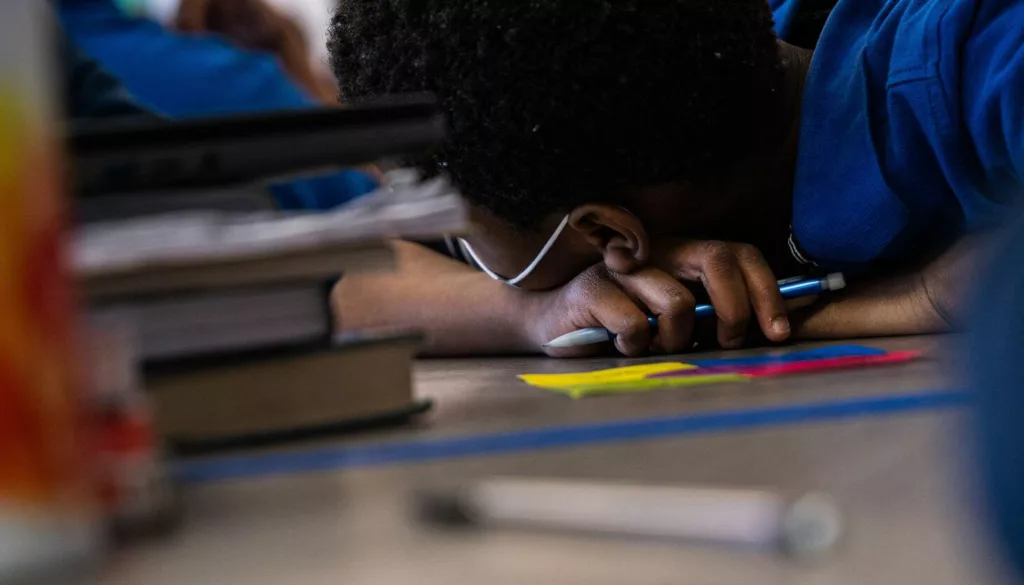[ad_1]
Almost two-thirds of New York Town college students who are entitled to bilingual distinctive schooling products and services are not getting all of their mandated help, according to new figures launched by the city’s schooling division.
At the stop of previous university year, just 36% of children who were assigned bilingual exclusive instruction expert services gained the proper amount of money of instruction from a qualified bilingual teacher and in a classroom with the correct ratio of students and team.
That means about 3,100 learners did not get their accurate classroom placements, including these that are co-taught and include things like a combine of exclusive and common schooling learners, courses with higher employees ratios completely for college students with disabilities, or cases where students are pulled out of their classrooms for small team instruction. By comparison, 88% of all learners with disabilities have been positioned in the right setting stated on their individualized instruction application, or IEP, which officials mentioned is the greatest rate on history.
The stats are section of the city’s annual exclusive education report and refer to products and services sent previous university year, when students have been demanded to show up at university in particular person for the to start with time given that the pandemic led to shuttered buildings in March 2020. The report now includes extra in depth breakdowns for students who are entitled to bilingual special training products and services, revealing troubling gaps among those people learners and their English-talking friends.
For a long time, condition officers have criticized the town for failing to present bilingual unique education expert services, putting the education and learning department on a corrective action plan in part thanks to ongoing shortages of certified bilingual educators and service providers. Advocates emphasized that all those troubles are even far more urgent now, as around 14,000 college students have enrolled in the city’s general public faculties given that July, a lot of of whom are trying to find asylum and may perhaps not speak fluent English.
“It is unconscionable that the city has nevertheless to absolutely close the gaps for immigrants with disabilities,” Andrea Ortiz, senior manager of education and learning plan at the New York Immigration Coalition, wrote in an e mail, noting that missing products and services and instruction all through the pandemic hit English learners specially tricky. She extra that caregivers who really don’t converse English have also struggled to accessibility translated IEPs and other unique schooling files.
Town figures also exhibit major gaps in entry to other wraparound support, although there have been substantial enhancements due to the fact the preceding school year. About 21% of bilingual learners who were entitled to counseling providers been given none or only element of their required sessions, significantly greater than the 6% amount for all other students with disabilities. In the meantime, 13% of pupils who were being entitled to get bilingual speech remedy gained none or only section of their demanded sessions, about the exact as final yr. Only 3% of their English-talking peers fell into that category.
Lori Podvesker, director of disability and schooling plan at IncludeNYC, also pointed to an increase in the share of English learners who are qualified for particular education and learning companies but are waiting more than the demanded 60 times for an IEP meeting. About 32% of English learners fell into that class, up from 23% the yr before.
“That’s considerable — that shows the require for far more bilingual evaluators and suppliers,” she stated.
Education and learning section officials famous in the report that a person purpose learners may well not obtain all of their bilingual distinctive education solutions is households could not want to relocate their children to colleges that can offer the comprehensive selection of guidance.
“Many families do not shift their boy or girl to a school exactly where a bilingual application is out there, and the DOE does not drive households to accept placement in a unique school for the explanation of unique training programming,” the report notes.
The office is working with superintendents across nine of the city’s 32 districts to insert bilingual exclusive training classes, according to the report. They are also utilizing federal reduction funding to give modest group instruction, frequently outdoors of their normal lecture rooms, for bilingual pupils who are not getting all of their classroom expert services. Officers also wrote that they are making an attempt to speed up distinctive schooling evaluations, including by including psychologists to faculty aid teams and growing after-college evaluation websites.
Nevertheless, advocates argue that family members aren’t to blame if nearby educational facilities just can’t present bilingual special schooling support, noting that traveling extended distances to protected providers could not be tenable for younger children, and the city’s yellow bus method is notoriously unreliable. Furthermore, some people just aren’t made available companies at all if there are no obtainable seats, according to Janyll Canals-Kernizan, director of the Robin Hood Undertaking at Advocates for Kids, who functions with households in search of bilingual specific schooling companies.
“It’s not just that households are getting presented a thing and they’re rejecting it mainly because it is significantly absent. It’s also that [they] are mandated to acquire these supports on their IEPs,” she explained, “and they just never get it.”
Below town regulation, the yearly exclusive education and learning report is owing by Nov. 1, even though metropolis officials did not release it until this month inspite of repeated requests. An instruction department spokesperson did not answer to a problem about what brought about the hold off.
Reema Amin contributed.
Alex Zimmerman is a reporter for Chalkbeat New York, covering NYC public educational institutions. Get in touch with Alex at [email protected].
[ad_2]
Resource url
To find out about the courses we have on offer: Click Here
Join the Course: Click Here


